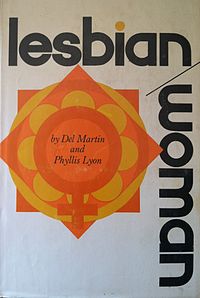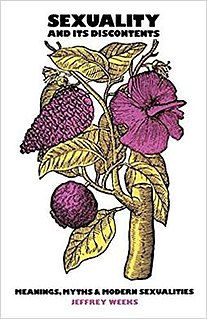Radical feminism is a perspective within feminism that calls for a radical reordering of society in which male supremacy is eliminated in all social and economic contexts, while recognizing that women's experiences are also affected by other social divisions such as in race, class, and sexual orientation.

The sexual revolution, also known as a time of sexual liberation, was a social movement that challenged traditional codes of behavior related to sexuality and interpersonal relationships throughout the United States and subsequently, the wider world, from the 1960s to the 1980s. Sexual liberation included increased acceptance of sex outside of traditional heterosexual, monogamous relationships. The normalization of contraception and the pill, public nudity, pornography, premarital sex, homosexuality, masturbation, alternative forms of sexuality, and the legalization of abortion all followed.

Biphobia is aversion toward bisexuality and bisexual people as individuals. It can take the form of denial that bisexuality is a genuine sexual orientation, or of negative stereotypes about people who are bisexual. Other forms of biphobia include bisexual erasure. Specific people of any sexual orientation can experience or perpetuate biphobia.
Sex-positive feminism is a movement that began in the early 1980s centering on the idea that sexual freedom is an essential component of women's freedom. Some feminists became involved in the sex-positive feminist movement in response to efforts by anti-pornography feminists to put pornography at the center of a feminist explanation of women's oppression.

Lesbian feminism is a cultural movement and critical perspective, most influential in the 1970s and early 1980s, that encourages women to focus their efforts, attentions, relationships, and activities towards their fellow women rather than men and often advocates lesbianism as the logical result of feminism.
Anti-climax or anticlimax may refer to:
Political lesbianism is a phenomenon within feminism, primarily second-wave feminism and radical feminism; it includes, but is not limited to, lesbian separatism. Political lesbianism embraces the theory that sexual orientation is a political and feminist choice, and advocates lesbianism as a positive alternative to heterosexuality for women as part of the struggle against sexism.
Sheila Jeffreys is a former professor of political science at the University of Melbourne. An English expatriate and lesbian feminist scholar, she analyses the history and politics of human sexuality.

Julie Bindel is an English radical feminist writer and co-founder of the law-reform group Justice for Women, which since 1991 has helped women who have been prosecuted for killing violent male partners.

A Natural History of Rape: Biological Bases of Sexual Coercion is a 2000 book by the biologist Randy Thornhill and the anthropologist Craig T. Palmer, in which the authors argue that evolutionary psychology can account for rape among human beings, maintain that rape is either a behavioral adaptation or a byproduct of adaptive traits such as sexual desire and aggressiveness, and make proposals for preventing rape. They also criticize the assumption that there is a connection between what is naturally selected and what is morally right or wrong, which they refer to as the "naturalistic fallacy", and the idea, popularized by the feminist author Susan Brownmiller in Against Our Will (1975), that rape is an expression of male domination and is not sexually motivated.

The Evolution of Human Sexuality is a 1979 book about human sexuality by the anthropologist Donald Symons, in which the author discusses topics such as human sexual anatomy, ovulation, orgasm, homosexuality, sexual promiscuity, and rape, attempting to show how evolutionary concepts can be applied to humans. Symons argues that the female orgasm is not an adaptive trait and that women have the capacity for it only because orgasm is adaptive for men, and that differences between the sexual behavior of male and female homosexuals help to show underlying differences between male and female sexuality. In his view, homosexual men tend to be sexually promiscuous because of the tendency of men in general to desire sex with a large number of partners, a tendency that in heterosexual men is usually restrained by women's typical lack of interest in promiscuous sex. Symons also argues that rape can be explained in evolutionary terms and feminist claims that it is not sexually motivated are incorrect.

Lesbian/Woman is a work by the feminist and gay rights activists Del Martin and Phyllis Lyon, in which the authors discuss what it means to be a lesbian. The book was influential and is considered a foundational text of lesbian feminism. Reviewers believed that it benefited from its authors' personal experience as lesbians, and endorsed its criticisms of the treatment of lesbians by religious and professional organizations.
Feminist views on sexuality widely vary. Many feminists, particularly radical feminists, are highly critical of what they see as sexual objectification and sexual exploitation in the media and society. Radical feminists are often opposed to the sex industry, including opposition to prostitution and pornography. Other feminists define themselves as sex-positive feminists and believe that a wide variety of expressions of female sexuality can be empowering to women when they are freely chosen. Some feminists support efforts to reform the sex industry to become less sexist, such as the feminist pornography movement.

The Industrial Vagina: The Political Economy of the Global Sex Trade is a 2008 book about prostitution and the sex industry by the political scientist Sheila Jeffreys. It received positive reviews, praising Jeffreys for covering many different aspects of the sex industry.

Sexuality and Its Discontents: Meanings, Myths, and Modern Sexualities is a 1985 book about the politics and philosophy of sex by the sociologist Jeffrey Weeks. The book received positive reviews, crediting Weeks with explaining the theories of sexologists and usefully discussing controversial sexual issues. However, Weeks was criticised for his treatment of feminism and sado-masochism.

Sex and Reason is a 1992 book about human sexuality by the economist Richard Posner, in which the author attempts to explain sexual behavior in economic terms and discusses a range of controversial subjects related to sex, proposing reforms in American laws.
The Leeds Revolutionary Feminist Group was a feminist organisation active in the United Kingdom in the 1970s and 1980s. While there were a number of contemporary revolutionary feminist organisations in the UK, the Leeds group was 'internationally significant'. The group is remembered chiefly for two reasons. The first is organising the UK-wide ‘Reclaim the Night’ marches in November 1977. The second is the publication of the pamphlet Political Lesbianism: The Case Against Heterosexuality, which advocated political lesbianism. British activist Sheila Jeffreys was closely involved with the group, while UK feminist Julie Bindel has spoken of the group's influence on her, as have many others.

Christianity, Social Tolerance, and Homosexuality: Gay People in Western Europe from the Beginning of the Christian Era to the Fourteenth Century is a 1980 book about the history of Christianity and homosexuality by the historian John Boswell.
Spinifex Press is an independent feminist book publisher based in Australia. It was established in March 1991 by Renate Klein and Susan Hawthorne. It has over 200 titles in print and publishes both fiction and non-fiction that is innovative and controversial. It specialises in subjects of feminist interest including lesbian literature, women's health, writing by indigenous, Asian and African women and books discussing ecology, globalisation, violence against women, prostitution and pornography. Spinifex was one of the earliest Australian publishers to adapt to new technologies by offering a web-based catalogue and enabling on-line purchase of all titles. It has been publishing ebooks since 2006.

Sexual Dissidence: Augustine to Wilde, Freud to Foucault is a book about the philosophy of sex by the social theorist Jonathan Dollimore. The book received both positive and mixed reviews. Dollimore was complimented for his discussions of the theologian Augustine of Hippo and the writers Oscar Wilde and André Gide, but was criticized for his repetitive style of writing.












